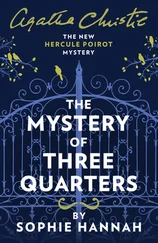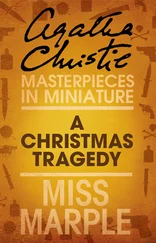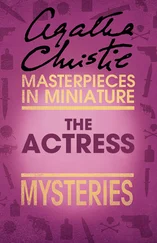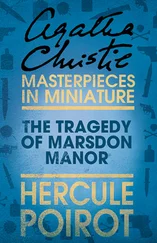Agatha Christie - Three Act Tragedy
Здесь есть возможность читать онлайн «Agatha Christie - Three Act Tragedy» весь текст электронной книги совершенно бесплатно (целиком полную версию без сокращений). В некоторых случаях можно слушать аудио, скачать через торрент в формате fb2 и присутствует краткое содержание. Жанр: Классический детектив, на английском языке. Описание произведения, (предисловие) а так же отзывы посетителей доступны на портале библиотеки ЛибКат.
- Название:Three Act Tragedy
- Автор:
- Жанр:
- Год:неизвестен
- ISBN:нет данных
- Рейтинг книги:4.5 / 5. Голосов: 2
-
Избранное:Добавить в избранное
- Отзывы:
-
Ваша оценка:
- 100
- 1
- 2
- 3
- 4
- 5
Three Act Tragedy: краткое содержание, описание и аннотация
Предлагаем к чтению аннотацию, описание, краткое содержание или предисловие (зависит от того, что написал сам автор книги «Three Act Tragedy»). Если вы не нашли необходимую информацию о книге — напишите в комментариях, мы постараемся отыскать её.
Three Act Tragedy — читать онлайн бесплатно полную книгу (весь текст) целиком
Ниже представлен текст книги, разбитый по страницам. Система сохранения места последней прочитанной страницы, позволяет с удобством читать онлайн бесплатно книгу «Three Act Tragedy», без необходимости каждый раз заново искать на чём Вы остановились. Поставьте закладку, и сможете в любой момент перейти на страницу, на которой закончили чтение.
Интервал:
Закладка:
“ Ah, mais c’est magnifique, ça! ” he exclaimed ecstatically. “The deduction, the reconstruction – perfect! You should have been a great detective, Sir Charles, instead of a great actor.”
Sir Charles received these plaudits with becoming modesty – his own particular brand of modesty. He had not received compliments on his stage performances for many years without perfecting a manner of acknowledging them.
“Your observation, too, it was very just,” said Poirot, turning to Mr. Satterthwaite. “That point of yours about his sudden familiarity with the butler.”
“Do you think there is anything in this Mrs. de Rushbridger idea?” asked Sir Charles eagerly.
“It is an idea. It suggests – well, it suggests several things, does it not?”
Nobody was quite sure about the several things, but nobody liked to say so, so there was merely an assenting murmur.
Sir Charles took up the tale next. He described his and Egg’s visit to Mrs. Babbington and its rather negative result.
“And now you’re up to date,” he said. “You know what we do. Tell us: how does it all strike you?”
He leaned forward, boyishly eager.
Poirot was silent for some minutes. The other three watched him.
He said at last:
“Can you remember at all, mademoiselle, what type of port glass Sir Bartholomew had on his table?”
Sir Charles interposed just as Egg was shaking her head vexedly.
“I can tell you that.”
He got up and went to the cupboard, where he took out some heavy cut-glass sherry glasses.
“They were a slightly different shape, of course – more rounded – proper port shape. He got them at old Lammersfield’s sale – a whole set of table glass. I admired them, and as there were more than they needed, he passed some of them on to me. They’re good, aren’t they?”
Poirot took the glass and turned it about in his hand.
“Yes,” he said. “They are fine specimens. I thought something of that kind had been used.”
“Why?” cried Egg.
Poirot merely smiled at her.
“Yes,” he went on, “the death of Sir Bartholomew Strange could be explained easily enough; but the death of Stephen Babbington is more difficult. Ah, if only it had been the other way about!”
“What do you mean, the other way about?” asked Mr. Satterthwaite.
Poirot turned to him.
“Consider, my friend. Sir Bartholomew is a celebrated doctor. There might be many reasons for the death of a celebrated doctor. A doctor knows secrets, my friend, important secrets. A doctor has certain powers. Imagine a patient on the borderline of sanity. A word from the doctor, and he will be shut away from the world – what a temptation to an unbalanced brain! A doctor may have suspicions about the sudden death of his patients – oh, yes, we can find plenty of motives for the death of a doctor.
“Now, as I say, if only it had been the other way about. If Sir Bartholomew Strange had died first and then Stephen Babbington. For Stephen Babbington might have seen something – might have suspected something about the first death.”
He sighed and then resumed.
“But one cannot have a case as one would like to have it. One must take a case as it is. Just one little idea I should like to suggest. I suppose it is not possible that Stephen Babbington’s death was an accident – that the poison (if poison there was) was intended for Sir Bartholomew Strange, and that, the wrong man was killed.”
“That’s an ingenious idea,” said Sir Charles. His face, which had brightened, fell again. “But I don’t believe it will work. Babbington came into this room about four minutes before he was taken ill. During that time the only thing that passed his lips was half a cocktail – there was nothing in the cocktail – ”
Poirot interrupted him.
“That you have already told me – but suppose, for the sake of argument, that there was something in that cocktail. Could it have been intended for Sir Bartholomew Strange and did Mr. Babbington drink it by mistake?”
Sir Charles shook his head.
“Nobody who knew Tollie at all well would have tried poisoning him in a cocktail.
Why?”
“Because he never drank them.”
“Never?”
“Never.”
Poirot made a gesture of annoyance.
“Ah – this business – it goes all wrong. It does not make sense… ”
“Besides,” went on Sir Charles, “I don’t see how any one glass could have been mistaken for another – or anything of that kind. Temple carried them round on a tray and everyone helped themselves to any glass they fancied.”
“True,” murmured Poirot. “One cannot force a cocktail like one forces a card. What is she like, this Temple of yours? She is the maid who admitted me tonight – yes?”
“That’s right. I’ve had her three or four years – nice steady girl – knows her work. I don’t know where she came from – Miss Milray would know all about that.”
“Miss Milray, that is your secretary? The tall woman – somewhat of the Grenadier?”
“Very much of the Grenadier,” agreed Sir Charles.
“I have dined with you before on various occasions, but I do not think I met her until that night.”
“No, she doesn’t usually dine with us. It was a question of thirteen, you see.”
Sir Charles explained the circumstances, to which Poirot listened very attentively.
“It was her own suggestion that she should be present? I see.”
He remained lost in thought a minute, then she said:
“Might I speak to this parlourmaid of yours, this Temple?”
“Certainly, my dear fellow.”
Sir Charles pressed a bell. It was answered promptly.
“You rang, sir?”
Temple was a tall girl of thirty-two or three. She had a certain smartness – her hair was well brushed and glossy, but she was not pretty. Her manner was calm and efficient.
“M. Poirot wants to ask you a few questions,” said Sir Charles.
Temple transferred her superior gaze to Poirot.
“We are talking of the night when Mr. Babbington died here,” said Poirot. “You remember that night?”
“Oh, yes, sir.”
“I want to know exactly how cocktails were served.”
“I beg your pardon, sir.”
“I want to know about the cocktails. Did you mix them?”
“No, sir, Sir Charles liked doing that himself. I brought in the bottle – the vermouth, the gin, and all that.”
“Where did you put them?”
“On the table there, sir.”
She indicated a table by the wall.
“The tray with the glasses stood here, sir. Sir Charles, when he had finished mixing and shaking, poured out the cocktails into the glasses. Then I took the tray round and handed it to the ladies and gentlemen.”
“Were all the cocktails on the tray you handed?”
“Sir Charles gave one to Miss Lytton Gore, sir; he was talking to her at the time, and he took his own. And Mr. Satterthwaite – ” her eyes shifted to him for a moment “ – came and fetched one for a lady – Miss Wills, I think it was.”
“Quite right,” said Mr. Satterthwaite.
“The others I handed, sir; I think everyone took one except Sir Bartholomew.”
“Will you be so very obliging, Temple, as to repeat the performance. Let us put cushions for some of the people. I stood here, I remember – Miss Sutcliffe was there.”
With Mr. Satterthwaite’s help, the scene was reconstructed. Mr. Satterthwaite was observant. He remembered fairly well where everyone had been in the room. Then Temple did her round. They ascertained that she had started with Mrs. Dacres, gone on to Miss Sutcliffe and Poirot, and had then come to Mr. Babbington, Lady Mary and Mr. Satterthwaite, who had been sitting together.
This agreed with Mr. Satterthwaite’s recollection.
Читать дальшеИнтервал:
Закладка:
Похожие книги на «Three Act Tragedy»
Представляем Вашему вниманию похожие книги на «Three Act Tragedy» списком для выбора. Мы отобрали схожую по названию и смыслу литературу в надежде предоставить читателям больше вариантов отыскать новые, интересные, ещё непрочитанные произведения.
Обсуждение, отзывы о книге «Three Act Tragedy» и просто собственные мнения читателей. Оставьте ваши комментарии, напишите, что Вы думаете о произведении, его смысле или главных героях. Укажите что конкретно понравилось, а что нет, и почему Вы так считаете.












